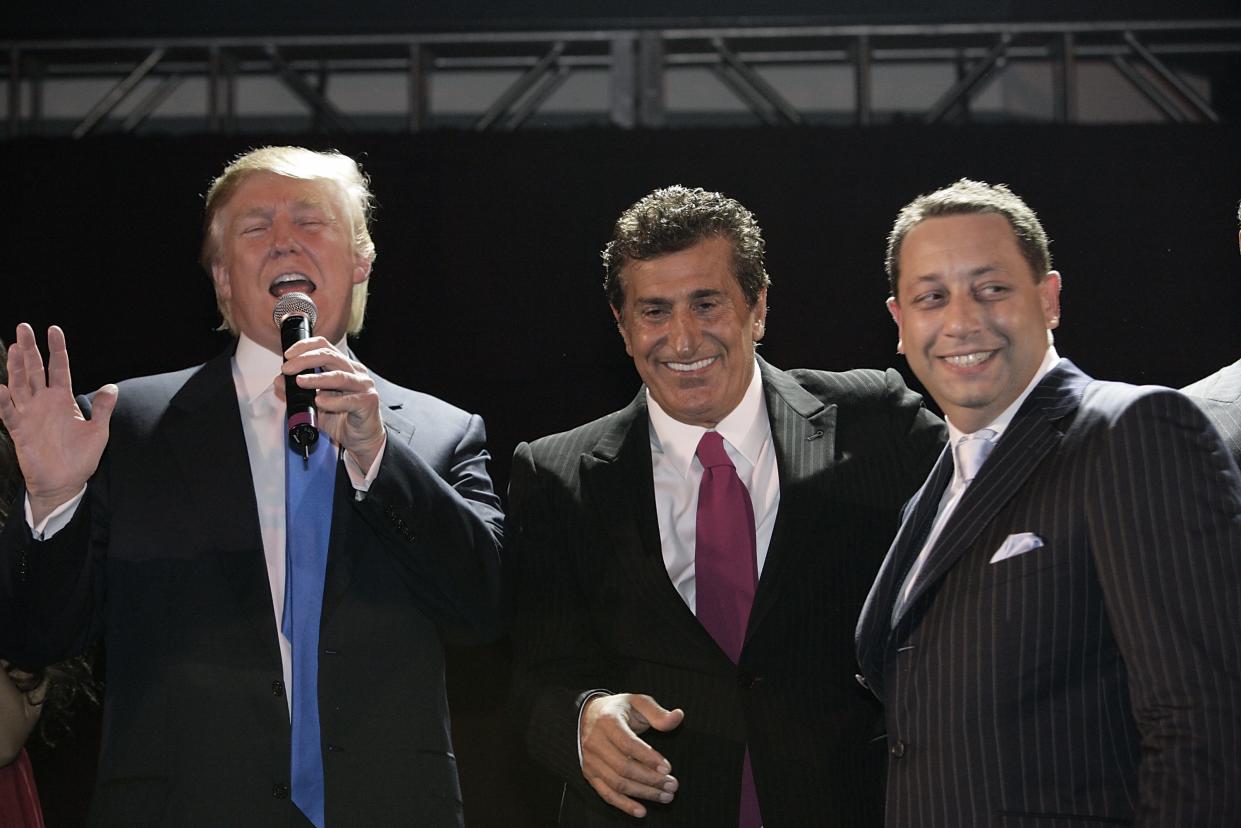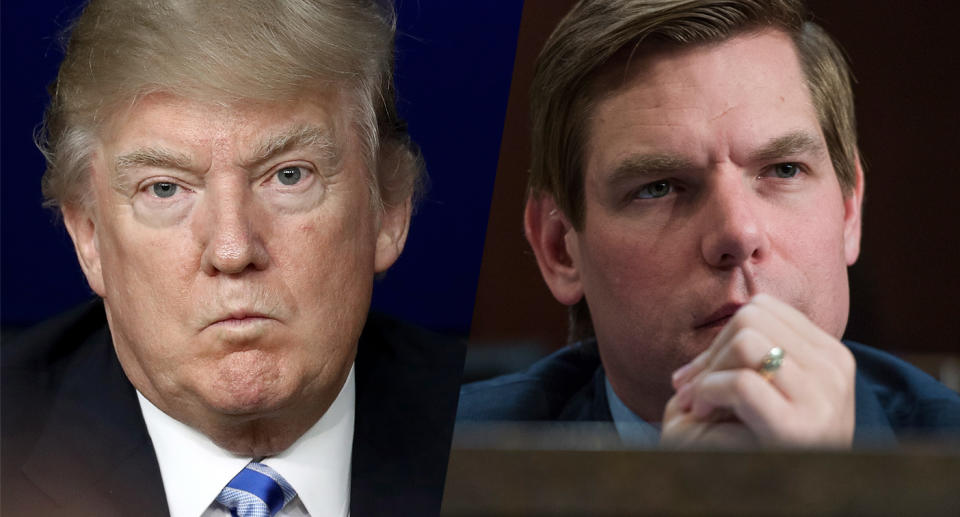Key Democrat: Panel may need to hear from president on Trump Tower Moscow project

WASHINGTON — A key Democrat on the House Intelligence Committee said the panel needs to seek testimony from Felix Sater, a business associate of President Trump, and may ultimately have to call the president himself in light of newly disclosed emails about a prospective Trump Tower project in Moscow that was being pursued during the early stages of last year’s presidential campaign.
“This is a bright light in an ever growing constellation of contacts between Donald Trump and Russia,” Rep. Eric Swalwell, D-Calif., told Yahoo News on Tuesday. In a hearing with then-FBI Director James Comey last March, Swalwell first raised questions about Sater’s role.
Swalwell told Yahoo News that Sater, a Russian-born convicted felon turned FBI informant, is a “relevant witness” who may have been a “pivotal player” in the relationship between Trump and the Russian government. But the committee will likely need to go further to resolve all the questions swirling about the issue, including seeking testimony directly from Trump. “We don’t want to be reckless,” said Swalwell. “But that should be on the table. My belief is we have to hear from all relevant witnesses, and it does look like he [Trump] is likely relevant.”
It would be extremely rare, but not unprecedented, for a president to testify before a congressional committee. The last known instance was in 1974 when then-President Gerald Ford testified before a House Judiciary Subcommittee about his pardon of his predecessor, Richard Nixon. (Before that, it hadn’t happened since Woodrow Wilson testified before the Senate Foreign Relations Committee about the League of Nations.) But the mere fact that a leading Democratic investigator is raising the issue illustrates the mounting stakes for the White House from the inquiries, both by Congress and special counsel Robert Mueller, into contacts he and his campaign had with Russian officials. Special White House counsel Ty Cobb said Tuesday night: “We will continue to cooperate with the committee’s investigation to the extent that it is appropriate.”
The potential new interest in Trump’s testimony was triggered by emails turned over to the House Intelligence Committee this week showing that even while he was running for president, Trump was pursuing a deal to build a giant Trump Tower in Moscow — an ambitious project, envisioned as the world’s tallest building and costing well over $100 million, that was conceived and pitched to the Trump Organization by Sater. The onetime Trump real estate adviser envisioned the project as a way to help Trump win the presidential election, the emails suggest. “Our boy can become president of the USA and we can engineer it,” Sater wrote in one email to Michael Cohen, then Trump’s lawyer and an executive vice president at the Trump Organization. “I will get all of Putins team to buy in on this, I will manage this process.”
Cohen, who even emailed Dmitri Peskov, the chief press spokesman for Putin, in January of last year to seek approval for the project, said this week that he pulled the plug on the project late that month because he “lost confidence” it would get the necessary approvals in Moscow. (Cohen is slated to testify before the House Intelligence Committee next Tuesday.) A White House official told Yahoo News that Trump himself had forgotten about the project and, while furious when recently shown the Sater-Cohen emails, insisted it proved his contention that he never colluded with Putin’s government because the Trump Tower Moscow deal never came to fruition.
But the newly discovered emails raise multiple questions about the accounts Trump and his aides have given about their dealings with Sater — a controversial figure who was twice convicted on felony charges, once for slashing another man’s face with a broken cocktail glass and a second time in a “pump and dump” Wall Street stock fraud involving the Genovese and Bonanno crime families. (Sater avoided prison in the later case by becoming an FBI informant on Russian organized crime and other matters.)

Sater later emerged as an adviser to the Trump Organization on real estate deals, both in New York and around the world, complete with an office in Trump Tower and a business card listing him as a “senior advisor to Donald Trump.” But when Trump was grilled under oath in a lawsuit about his relationship with Sater, he insisted he barely knew the Russian émigré.
“If he were sitting in the room right now, I really wouldn’t know what he looked like,” Trump testified in a video deposition for a 2013 civil lawsuit.
When Sater’s role arose last year as a potential campaign issue, Alan Garten, chief counsel for the Trump Organization, told reporters that Sater had been given the business card to pitch deals in 2010 but that he was never an employee and that the arrangement only lasted six months.
But those accounts are now being questioned in light of the new emails showing that Sater was still playing a role with the Trump Organization in pursuing the Moscow project in late 2015 and early 2016 — well after Trump had declared his candidacy for president.
“This is evidence that Sater never really stopped working for Trump,” said Frederick Oberlander, a lawyer who has sued Sater and the Trump Organization. “As a political matter it shows Trump’s willingness to engage ‘forever’ with a serially convicted felon with a background in massive financial fraud.”
Sater has consistently denied allegations that he defrauded anybody in Trump Organization projects. In a statement provided to Yahoo News by his lawyer, Sater said he was “not working” for the Trump Organization when he pitched the project to Cohen and “had the project been successful, I would not have been compensated” by the company. Sater did not address why he pursued a project for which he would not have been paid. But he indicated in his statement he had not discussed it with Trump.
“Michael Cohen was the only member of the Trump Organization who I communicated with on this project,” he said. “During the course of our communications over several months, I routinely expressed my enthusiasm regarding what a tremendous opportunity this was for the Trump Organization. Ultimately, in January 2016 Michael informed me that the Trump Organization decided not to move forward with the project.”
The questions about the Trump Tower Moscow project are among many the House Intelligence Committee and its Senate counterpart are now pursuing in what many see as an agonizingly slow pace. Nearly nine months into the inquiries, neither panel has yet to hold public hearings with any of the key players in the investigations, such as former national security adviser Michael Flynn, former campaign manager Paul Manafort, and Donald Trump Jr. Nor is it clear at this point that will ever happen given special counsel Mueller’s parallel criminal investigation, in which those players and many others are potential targets. Swalwell said the House committee has made “tremendous progress in the last eight weeks,” and he expects that in September it will be operating at a “pretty dizzying pace.” But asked when he expected the panel will be able to wrap up its probe and reach a finding, he said, “ideally before voters next go to the polls.” That would mean the investigation would likely continue well into next year and wouldn’t wrap up before November 2018 when voters will determine whether the House stays in Republican hands or will be taken over by Democrats inclined, like Swalwell, to cut Trump no slack at all.
Read more from Yahoo News:
‘We’re alive’: Texas woman describes what matters to her after fleeing Harvey’s floodwaters
Animal lover rescues bats trapped under bridge by Hurricane Harvey
Photos: ‘CATASTROPHE UNFOLDS’: How newspapers covered Harvey
.



